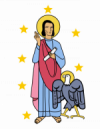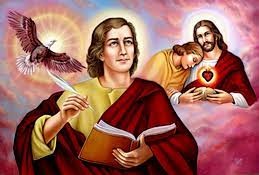Message for Sunday, May 7, 2023
Brothers and Sisters:
Jesus lives! Thy terrors now
can no more, O death , appal us;
Jesus lives ! by this we know
thou, O grave canst not enthral us .
Allelulia !
The Easter Season
Easter begins with an encounter with the living Christ, himself – an encounter, first, between unbelieving, broken followers, who, by finding Jesus in a wholly new incorruptible body were themselves resurrected. And now, our encounter, as the living Christ is present among us – with you – in his Spirit in the Eucharistic meal he instituted, and in his life which you appropriate here and now.
During the first Christian centuries, the events of the Great Fifty Days of Easter – from Easter to the Ascension to Pentecost — were looked on as a unified feast. The joyous Easter season is reflected in the seasonal changes in our worship: the liturgical colour is white; the Gloria and the Alleluia return; Alleluia! Christ is Risen! The Lord is risen indeed. Alleluia!
Everything we do as Christ’s disciples today have their grounding in the events of Good Friday and Easter.
“The light of Christ is a free gift. And those who accept that gift bask in the glow of that light. Christ transforms that which is broken and makes it whole. When we receive the light of Christ, we come to realize that our lives are not the same and they will never be the same again.”
Eastertide lasts 50 days ending with Pentecost. Ascension Day is 40 days after Easter.
The octave of Easter Day is often called Low Sunday. The Paschal Candle is lit until Pentecost, although in some places it is extinguished on Ascension Day.
St. John the Evangelist
We also celebrate today in the Cure with our sister Church, the Patronal Festival celebration at St. John, the Feast of St. John the Evangelist.
The question is often asked which St. John is celebrated in this feast? It is not John the Baptist, the cousin of Jesus; rather it’s the young disciple of Christ, known as “the disciple whom Jesus loved.” Tradition holds that he is the author of the Gospel of John, the Epistles of John (I, II, and III John) as well as the author of the Book of Revelation, also known as The Apocalypse. He’s also known as John the Apostle, John the Divine, John the Theologian, and John of Patmos.
Why? John is unique among the Twelve Disciples in that according to tradition, going back to at least the 2nd century if not earlier, he is the only one who did not die a martyr like the rest. Instead, in addition to participating in Jesus’ ministry and that of the early church, he lived to old age in Ephesus. He was originally one of the followers of John the Baptist. He and his brother James, both fishermen, were called to be disciples of Jesus and along with Peter were considered to be among the inner circle.
https://en.wikipedia.org/wiki/John_the_Evangelist
Contributed!

